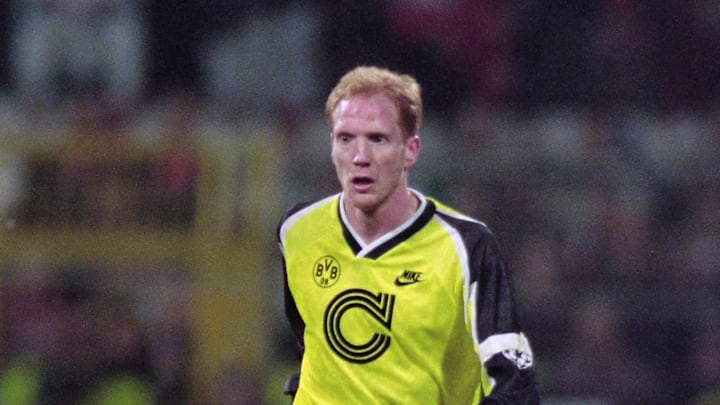For Borussia Dortmund, greatness has never been defined by money or glamour, it has always been about identity. In a football world that often celebrates fleeting success, Dortmund’s legends have been built on loyalty, resilience, and an unbreakable bond with the yellow wall. They are players who didn’t just represent the club, they became part of its soul.
Across generations, these figures have embodied the essence of Borussia Dortmund: courage in adversity, passion in every tackle, and unity between pitch and stands. From the disciplined leadership that powered European triumphs in the 1990s to the unwavering loyalty that guided the club through financial crisis and revival, Dortmund’s story is not written by moments, but by men who gave everything for black and yellow.
Each era has produced its heroes. In the 1990s, players like Matthias Sammer and Michael Zorc laid the foundations of a golden era. The 2000s were carried by the quiet strength of Sebastian Kehl and Roman Weidenfeller, who preserved the club’s spirit when trophies faded. And in the 2010s, Marco Reus and Lukasz Piszczek redefined what it means to be loyal in modern football.
If Borussia Dortmund were to create a Hall of Fame, it wouldn’t simply honour titles or statistics, it would celebrate devotion, leadership, and heart. These are the players who didn’t just play for Dortmund. They lived it.
Matthias Sammer – The Ballon d’Or Winner
Few players have embodied Borussia Dortmund’s transformation from potential to power quite like Matthias Sammer. Arriving from Inter Milan in 1993, Sammer didn’t just strengthen Dortmund’s defence, he redefined it. Operating as a libero, he blended the precision of a playmaker with the authority of a general, anchoring a side that would soon dominate Germany and Europe.
Under Ottmar Hitzfeld, Sammer became the beating heart of a Dortmund team that balanced tactical discipline with fearless ambition. His anticipation, timing, and leadership gave the side a steel that underpinned their creative flair. He read games two steps ahead, organising those around him and dictating tempo from deep, a rare blend of defensive intellect and attacking instinct.

The peak came in 1996, when Sammer captained Germany to European Championship glory and claimed the Ballon d’Or, a rare honour for a defender and a testament to his influence on both club and country. The following year, he led Dortmund to their greatest triumph, the 1997 UEFA Champions League, where his command and composure defined the club’s golden era.
For Dortmund, he wasn’t merely a captain, he was a commander, the player whose leadership elevated an entire generation.
Tomas Rosicky – The Magician Before the Money
Before Dortmund’s financial resurgence and the arrival of stars like Lewandowski and Reus, there was Tomas Rosicky, a playmaker who carried the club through one of its most turbulent periods. Signed from Sparta Prague in 2001, Rosicky’s flair and creativity offered hope during an era of transition and financial uncertainty.
Nicknamed “The Little Mozart” for his elegant control and orchestration of play, Rosicky’s influence went beyond statistics. His balance, agility, and ability to dictate rhythm made him the creative focal point of Matthias Sammer’s and later Bert van Marwijk’s teams. At a time when Dortmund struggled for consistency, Rosicky represented beauty among chaos, a reminder of what the club could still aspire to be.

His performances in the early 2000s Champions League campaigns, particularly in the 2002 run to the final, demonstrated his ability to rise on the biggest stages. Whether gliding past markers or threading through passes between defensive lines, Rosicky’s artistry kept Dortmund competitive and entertaining during difficult years.
Though he left for Arsenal in 2006, his legacy at Dortmund remains underappreciated, a creative pioneer who kept the flame alive when the lights seemed dim. In many ways, Rosicky symbolised the soul of Dortmund football: expressive, daring, and eternally committed to beauty in motion.
Marco Reus – The Eternal Captain
If Sammer brought leadership and Rosicky artistry, then Marco Reus brought devotion. Few modern players have shown the same level of loyalty and emotional connection to Borussia Dortmund as Reus, whose career has been defined by perseverance as much as talent.
Since rejoining from Borussia Monchengladbach in 2012, Reus has been the face of Dortmund’s modern identity, a player who turned down moves to Europe’s biggest clubs to remain faithful to the one that shaped him. His ability to drift between lines, score decisive goals, and inspire with understated charisma has made him a symbol of modern BVB.

Under Jurgen Klopp, Reus was part of the side that reignited Dortmund’s presence in Europe. Under Thomas Tuchel, he became the tactical focal point, a creative leader capable of carrying games through sheer intelligence. And under Edin Terzic, he evolved again, embracing the role of mentor and captain, guiding a new generation of players who grew up idolising him.
Injuries may have denied Reus some of the international acclaim his talent deserved, but at Dortmund, his name carries a deeper weight. He represents continuity, integrity, and passion, the values that transcend trophies. For the fans, Marco Reus is not just a player, he is Borussia Dortmund personified.
From Sammer’s authority to Rosicky’s artistry and Reus’ loyalty, each player represents a pillar of Borussia Dortmund’s footballing philosophy. They come from different eras yet share one truth, they defined what it means to play for a club where heart matters as much as trophies.
Dortmund’s history is rich with goals, tactics, and triumphs, but it is these figures who remind us that greatness is measured not only by medals, but by legacy. And in that sense, Sammer, Rosicky, and Reus stand not just as legends, but as eternal members of Dortmund’s Hall of Fame.
